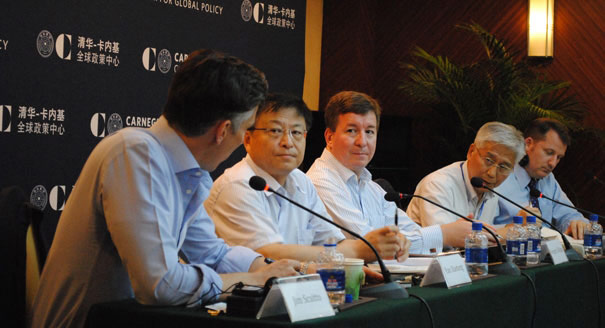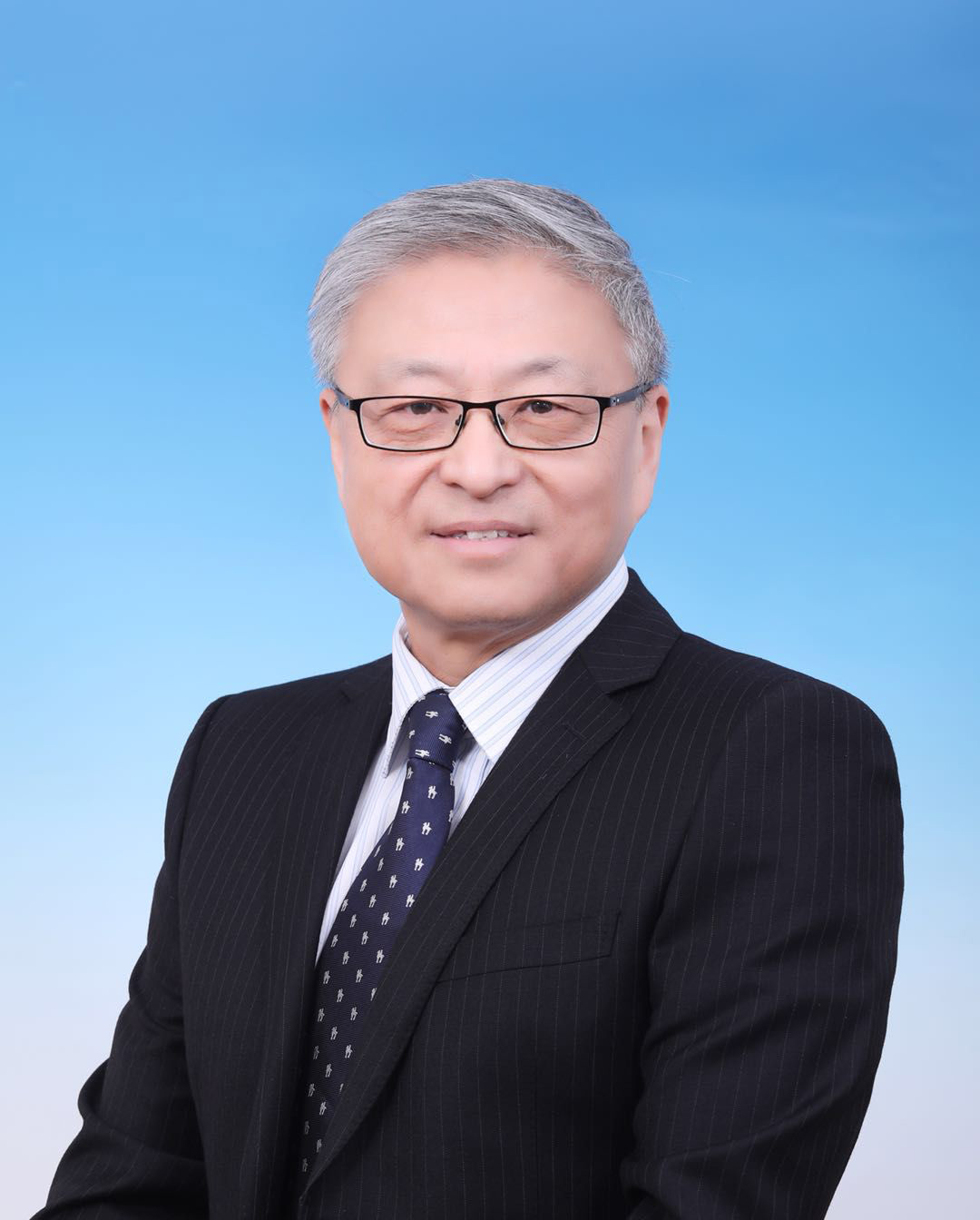{
"authors": [
"James Sciutto",
"Paul Haenle",
"Yan Xuetong",
"Gregory Gilligan",
"Cui Liru"
],
"type": "event",
"centerAffiliationAll": "",
"centers": [
"Carnegie Endowment for International Peace",
"Carnegie China"
],
"collections": [
"China’s Foreign Relations",
"U.S.-China Relations"
],
"englishNewsletterAll": "",
"nonEnglishNewsletterAll": "",
"primaryCenter": "Carnegie China",
"programAffiliation": "",
"programs": [],
"projects": [],
"regions": [
"North America",
"United States",
"East Asia",
"China"
],
"topics": [
"Foreign Policy"
]
}
A New Type of Great Power Relations Between China and the United States
Sat, July 6th, 2013
Beijing
On the heels of Chinese President Xi Jinping and U.S. President Barack Obama’s historic meeting at the Sunnylands Estate in California, analysts seek to assess what was achieved, and the implications for U.S.-China relations moving forward. Both leaders seem to have embraced the task of establishing a new model of cooperation between China and the United States in the hopes of avoiding the unhealthy competition or conflict that is historically produced by the rise of new powers.
As part of Tsinghua University’s annual International Relations Conference, the Carnegie-Tsinghua Center for Global Policy hosted a panel featuring Chinese and U.S. experts from the academic, government, and private sectors to discuss the outcome of the summit and Xi’s concept of a “new type of great power relations.” James Sciutto, former chief of staff for U.S. Ambassador to China Gary Locke and a long-time foreign correspondent for ABC News, moderated the event.
China’s “New Type of Great Power Relations”
As with the U.S. rebalancing to Asia, Xi’s strategic concept of a “new type of great power relations” between the United States and China has been subject to much scrutiny and varying interpretations.
- Avoiding Conflict: Cui Liru, former president of the China Institutes of Contemporary International Relations, noted that the term was intended to address the inevitable conflict between established and rising powers. The phrase, Cui added, has developed into an opportunity for exploring mechanisms to prevent hostilities between China and the United States. It serves as a basic operational definition that has the potential to evolve into more defined measures of U.S.-China cooperation. Carnegie-Tsinghua’s Paul Haenle responded that placing excessive focus on defining the phrase detracts attention from the long-term objective of making joint progress on shared issues to reflect a new type of U.S.-China working relationship.
- Implications: Haenle explained that some U.S. experts and officials are concerned that Xi’s concept prematurely puts China on an equal footing with the United States, with an aim to compel Washington to respect China’s core interests and sphere of influence, and therefore accommodate China on its own terms. He added that Obama did not reject China’s “new type of major country relations” at Sunnylands but that the U.S. president used slightly different language to describe the idea. The United States, Haenle said, accepted the premise, but there should not be an expectation of immediate change. The differences between Beijing and Washington on important issues should be addressed, but neither side should expect the other power to change its principles on long-standing areas of disagreement such as Taiwan, territorial disputes, trade, or human rights overnight. Such expectation would set the effort for improved U.S.-China relations up for failure.
- More Chinese-Sponsored Public Goods: Carnegie-Tsinghua’s Yan Xuetong argued that the rhetoric describing China’s great power status indicates that Beijing’s increased global clout will require it to start contributing global public goods. Yan noted that if the United States and China started working together to produce these goods, it would benefit the world and improve the current international system for public goods, which currently is primarily supported by the United States.
- Importance of this Debate: Despite the differing interpretations of China’s “new type of major country relations,” Cui asserted that this term signifies a new starting point in China’s foreign relations. Haenle suggested the Obama administration’s hesitancy to adopt this terminology indicates that Obama is more focused upon delivering results and identifying areas of cooperation than seeking a concrete definition. Yan added the Western media’s translation of a “new type of great power relations” actually refers to China’s relations with all the great powers, not just with the United States. Additionally, since many Chinese reject the idea that China has reached “great power” status, Yan pointed out that many Chinese prefer to use “new type of major country relationship.”
Challenges for the U.S.-China Relationship
Cyberwarfare and China’s maritime disputes are two points of tension between the United States and China. If unresolved, these barriers may further hinder or even impair the bilateral relationship.
- Cyber Clashes: Greg Gilligan, chairman of the American Chamber of Commerce in China, stated that the focus on cybercrimes and the Edward Snowden affair is derailing U.S.-China cooperation in the commercial sectors. He stated that the United States does engage in cyber espionage, which he reminded was technically a legal activity, to fight terrorism and keep its citizens safe. But, Gilligan added, the United States challenges China on alleged Chinese state-sponsored theft of American trade secrets and intellectual property, which is illegal. Cui responded that U.S. predominance in the cyber realm and its use of cyber espionage to protect itself has the potential to be considered infringement or even an attack on Chinese sovereignty, which would harm the bilateral relationship.
- Potential Escalation in the East and South China Seas: Haenle advised that the chances of an unintentional clash in the South China Sea have increased. He added that factors such as nationalism could cause quick escalation of any conflict, and that U.S. commitments to regional allies could force it to become involved. Cui stated that the East and South China Sea problems are third-party problems; they are not U.S.-China issues. Thus, the threat of conflict is low, Cui concluded.
Space for Cooperation
Focusing on shared U.S.-Chinese interests can ease tensions and lead to mutually beneficial competition.
- Cyber Cooperation: Yan suggested that the Edward Snowden affair may have served as an impetus for China and the United States to develop norms and common definitions in regard to cybersecurity. Sciutto added that such a development could provide a “seed of solution,” or a template for cooperation on other issues.
- Stabilizing the Korean Peninsula: Cui added both China and the United States share the goals of nonproliferation and denuclearization of the Korean Peninsula. Haenle agreed, adding that recent developments on the Korean Peninsula are aligning Chinese and U.S. interests.
- Honest Dialogue and Interpersonal Relations: Panelists agreed that military-to-military relations between the two countries, which are vital to building strong trust and avoiding mutual suspicion, is making gradual progress since the Chinese leadership transition. Gilligan noted that people-to-people relations are improving as well. Gilligan and Haenle agreed that honest dialogue between China and the United States is integral to moving the bilateral agenda forward. Haenle added that U.S. and Chinese leaders need to move away from scripted talking points on critical issues so that the U.S.-China bilateral relationship can move to the next level.
Carnegie does not take institutional positions on public policy issues; the views represented herein are those of the author(s) and do not necessarily reflect the views of Carnegie, its staff, or its trustees.
Event Speakers
James Sciutto
Paul Haenle held the Maurice R. Greenberg Director’s Chair at the Carnegie Endowment for International Peace and is a visiting senior research fellow at the East Asian Institute, National University of Singapore. He served as the White House China director on the National Security Council staffs of former presidents George W. Bush and Barack Obama.
Yan Xuetong
Former President, Carnegie China Management Board, Carnegie-Tsinghua Center for Global Policy

Yan Xuetong was president of the Carnegie-Tsinghua Center Management Board until June 2020.
Gregory Gilligan
Cui Liru
